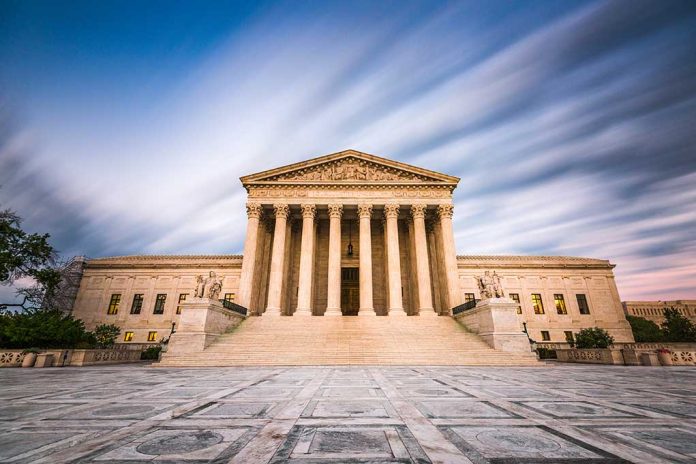
The Supreme Court unanimously backs the federal government’s authority to revoke visas linked to fraudulent marriages, limiting judicial oversight in immigration cases.
At a Glance
- Supreme Court rules 9-0 that federal courts cannot review visa revocation decisions
- Case centered on a Palestinian man’s visa revoked due to a previous fraudulent marriage
- Justice Ketanji Brown Jackson authored the unanimous opinion
- Ruling emphasizes DHS’s discretionary power in visa matters
- Decision upholds government’s ability to combat immigration fraud
Supreme Court Reinforces Federal Authority on Visa Revocations
In a landmark decision, the U.S. Supreme Court has ruled that federal courts lack the authority to review the government’s decisions to revoke immigration visas. The unanimous 9-0 ruling, delivered by Justice Ketanji Brown Jackson, reinforces the Department of Homeland Security’s (DHS) discretionary power in matters of immigration, particularly concerning fraudulent marriages.
The case, Bouarfa v. Mayorkas, originated when Amina Bouarfa, a U.S. citizen, filed an immigration petition for her husband, Ala’a Hamayel, a Palestinian national. Despite initial approval, the United States Citizenship and Immigration Services (USCIS) later revoked Hamayel’s visa due to suspicions surrounding a previous marriage believed to be fraudulent.
Legal Journey and Supreme Court’s Verdict
Bouarfa challenged the revocation through various legal channels, including the Board of Immigration Appeals and federal courts. However, both the federal district court and the U.S. Court of Appeals for the 11th Circuit dismissed the case, leading to the Supreme Court’s final ruling.
“The U.S. Supreme Court on Tuesday held that revocations of previously approved visa petitions cannot be appealed in federal courts because they are discretionary agency decisions that are not subject to judicial review.”
Justice Jackson’s opinion emphasized the broad discretionary power granted to the DHS Secretary in visa matters. The Court determined that visa revocations are “discretionary—no matter the basis for revocation,” effectively limiting the scope of judicial review in such cases.
Implications for Immigration Policy and Fraud Prevention
This ruling significantly bolsters the federal government’s ability to combat immigration fraud, particularly in cases of sham marriages. By reaffirming the DHS’s authority to revoke visas “at any time, for what he deems to be good and sufficient cause,” the Court has provided a powerful tool for immigration officials to address suspected fraud cases without the threat of judicial interference.
“May, at any time, for what he deems to be good and sufficient cause, revoke the approval of any [visa] petition.”
While the decision limits judicial review, Justice Jackson noted that individuals like Bouarfa are not left without recourse. They may file new visa petitions, which, if denied, could potentially be subject to judicial review under different circumstances. This provision ensures that while the government’s discretionary power is upheld, there remains a pathway for legitimate cases to be reconsidered.
Conservative Perspective on the Ruling
From a conservative standpoint, this Supreme Court decision represents a significant victory for national security and immigration control. By affirming the federal government’s authority to revoke visas without judicial interference, the ruling strengthens the executive branch’s ability to enforce immigration laws and protect the integrity of the legal immigration system.
The unanimous nature of the decision, including agreement from both conservative and liberal justices, underscores the importance of maintaining strong border controls and preventing abuse of the immigration system. This ruling aligns with conservative values of law and order, respect for legal processes, and the preservation of national sovereignty in matters of immigration.
As the Biden administration grapples with ongoing immigration challenges, this decision provides a clear mandate for stricter enforcement against fraudulent immigration practices. It reinforces the government’s role in safeguarding the nation’s borders and ensuring that only those who follow proper legal channels are granted the privilege of residing in the United States.
Sources
1. Supreme Court Rules US Government May Revoke Visas for Sham Marriages – The Epoch Times
2. High Court Bars Judicial Review Of Revoked Visa Petitions














